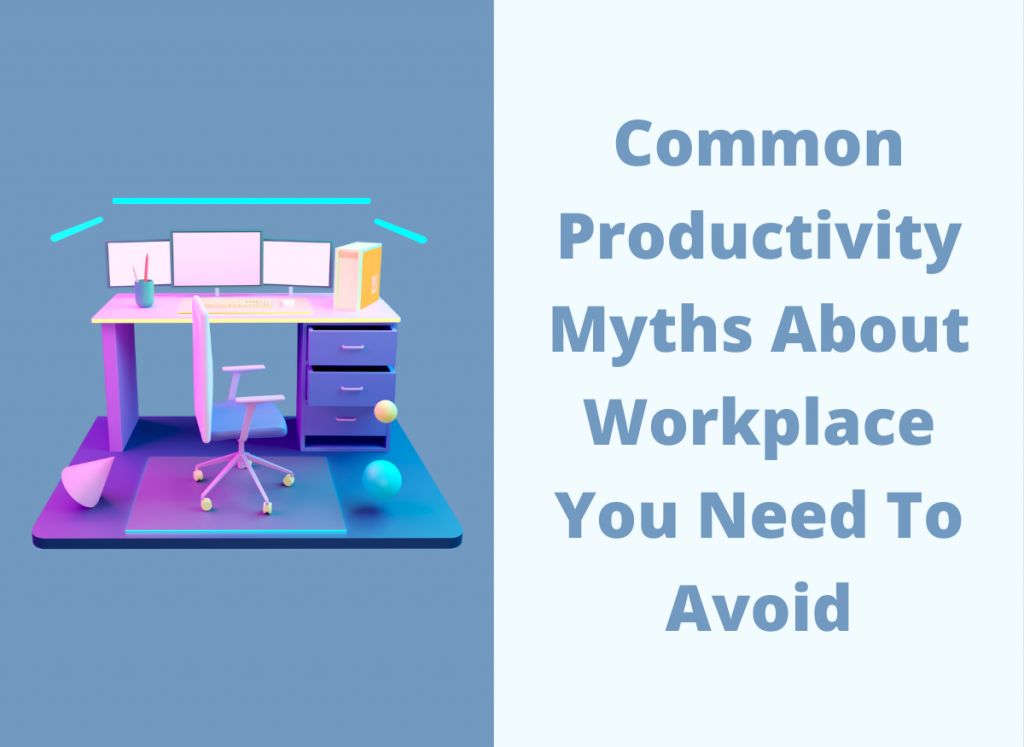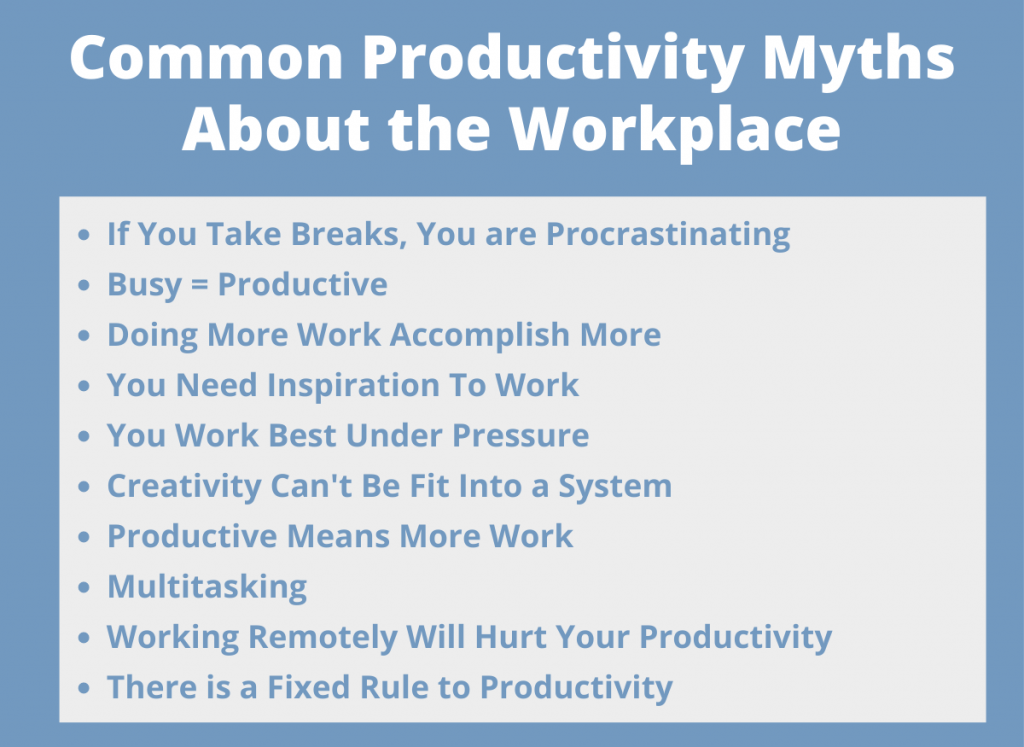
Hustling and grinding are glorified in this present world, and distraction runs rampant. We were taught that we are being lazy, unproductive, and procrastinating if we are not busy.
However, workplace culture feeds us myths about productivity that drain our energy, decrease our productivity, and cause burnout. Burnout is a process that many people experience; it’s not fun and is typically accompanied by negative symptoms like decreased creativity and lack of motivation.
This is where the power of the break comes in. Taking a break can be difficult because of its nature. We feel the office culture telling us that if we take breaks and are not constantly working, we are not working and procrastinating. However, taking a break is not related to procrastination, and if done right, it can be productive.
Common Productivity Myths About the Workplace

We have been taught many beliefs about productivity that often prevent us from doing everything we want to do.
Here are the myths about productivity that you need to stop believing.
If You Take Breaks, You are Procrastinating
Research suggests that the part of our brain responsible for executive function needs a break from time to time. There is a part of the brain that is in charge of goal management, attention, memory, decision making, and so much more. By giving your overworked brain a break, you can have a chance to refresh and get back to performing more effectively.
If you take a break when you are overworked, it will recharge and energize you. But taking an unnecessary break will only drain and deplete our energy. The goal is to take breaks actively, not passively.
Busy = Productive
Our work culture tells us that being busy and productive are the same, but they are two very different concepts. Employees are pressured into being productive by being busy and overworked, but this approach to our work actually makes us less productive over time.
Being busy is about working harder, and there is a need to be perfect in every work but being productive is a different game. Being productive means using your time wisely in your work and being the best at it.
There is a difference between being busy and productive. Being busy is deeply rooted in invalidation and approval seeking from others regarding success, whereas being productive helps us grow ourselves. It helps us to be effective and focused in life and business.
Doing More Work Accomplish More
We all have read about the articles and heard from our co-workers that working at something more will be better for us. But it is a myth, and we were being lied to. Quantity doesn’t mean quality. Quality work always beats the work that is done in a quantitative manner. One hour of a given task, which is done in a quality way, always excels the one which is to do in a quantitative way.
Productivity means achieving more by doing less.
You should seek the strategy that helps you accomplish more by doing the least amount of work. It will boost productivity.
You Need Inspiration To Work
No, you do not need the inspiration to work. Getting inspiration is wonderful, but it doesn’t mean getting stuff done. You need a preplanned system to capture the inspiration so that, when you are out of the inspiration, you can still get the work done.
You should have a schedule to complete your tasks in a given time. For example, you can create a Gantt chart if you develop a software or web application. In that chart, you have a specific timeframe to do specific tasks.
You Work Best Under Pressure
In this world, many people believe that they work under pressure of an upcoming deadline. But they don’t. It’s just an excuse.
Keeping employees in a high-stress and always-urgent mood is very bad for the employees and the business.
Making employees work under pressure causes your employees, colleagues, or clients to be stressed – and sooner or later, you’ll lose them. It will lose the important detail that you were too unable to recognize, damaging your job, reputation, and career.
Creativity Can’t Be Fit Into a System
Maybe you think that productivity is for business owners, not creative people like yourself. This is not correct for particularly two reasons, they are:
First one, creative work is still working. It can still fall into procrastination, poor planning.
The second one is that while you may have a knowledge of the demands of your creative work unless you’re comfortable with working very hard, chances are you have a lot more to do than just the creative stuff. There is a need to keep records; clients need to be contacted, taxes need to be paid, projects need to be completed, and so on. And here’s the thing: creative people generally don’t much like doing all that thing. Having a system to make that stuff speedy as possible means you can spend more time being creative.
Productive Means More Work
Being productive doesn’t mean more work. We all have heard about this proverb, “All work and no play makes Jack a dull boy”. It means that without taking time off from work, a person becomes both bored and boring.
Getting your work done in less time so that you can do twice as much work isn’t productive – it’s dumb.
Multitasking
When you try to do many things at once, you will not be able to do many complete tasks that much. It is much more preferable to do one task at a time. Rather than multitasking, focusing on completing the task with better quality is much more preferable. When you achieve a task competition by focusing on it solely, you are motivated to do a lot better. And you can move on to another project with positivity, confidence, and with a sense of accomplishment.
Therefore multitasking is a productivity myth. We can achieve better by focusing on one task at a time.
Working Remotely Will Hurt Your Productivity
This myth was actually true in the olden times when there were no facilities and infrastructure to do office work at a remote location outside of your company building. But in the present-day context, there is the availability of facilities, and there is the infrastructure to do your work in a remote location. Working remotely won’t hurt any productivity for jobs involving IT, creative jobs, and other jobs.
With modern technologies, you can actually do anything you did in office space at home. Working remotely becomes effective when you have an environment free from distraction. It doesn’t really matter where you are working from. In fact, there have been studies done to show that employees who work from a remote location such as home are actually more productive and happier.
There is a Fixed Rule to Productivity
Every person in this world is different. They are not robots, and the same rule can’t apply to all people. If it works for ‘X’, it may not work for ‘Y’. You can’t force a productivity system on everybody. So, there should be variable rules about productivity systems. People should be allowed to complete the work according to their preference.
Office Fun Activities to Try With Your Team
There are many fun activities to do with your team. This allows your team to build companionship with your teammates. Here are some team-building games and activities to try at your workplace.
Puzzle Games
You can play this game in the office by dividing the team into small groups and working together to solve a tricky puzzle. This could be anything from a brain teaser, picture puzzle, or Lego puzzle. After playing this game, you can brainstorm ideas of what worked and what did not. Then you can use these ideas and utilize this in your collective job tasks.
Scavenger Hunt
The scavenger hunt is a game where you find a list of items around your office. You can assign a person or a group of people to find the items around your office. This game is best for the new employees because it helps them get to know the offices’ places.
Memory Wall
We human beings like to share our experiences and good memories. By creating a memory wall in the office space where you can share your team members enjoying a vacation, you can boost the employees’ attachment to the organization. Over time, it will boost the bonds and grow relationships as you add to the wall.
Trivia Contests
You can play some trivia games in the office. It is a fun contest to be together. Trivia contests like TV series trivia, sports trivia, and anime trivia can be played. This will be beneficial to understand the employees’ interests and get to know each other.
Conclusion
In this article, we discussed the common productivity myths about workspaces we need to avoid. We need to discard these myths and implement new ideas to boost productivity in the office. Myths like being busy, multitasking, remote work causes productivity loss, taking fewer breaks, etc., are very bad. It can cause the employee to have burnout. So, these kinds of myths need to be discarded.
